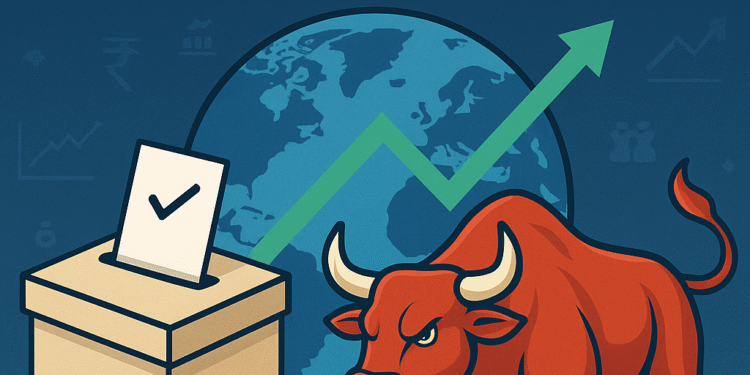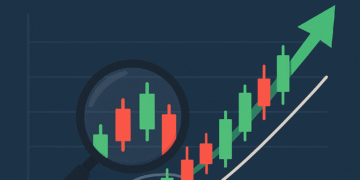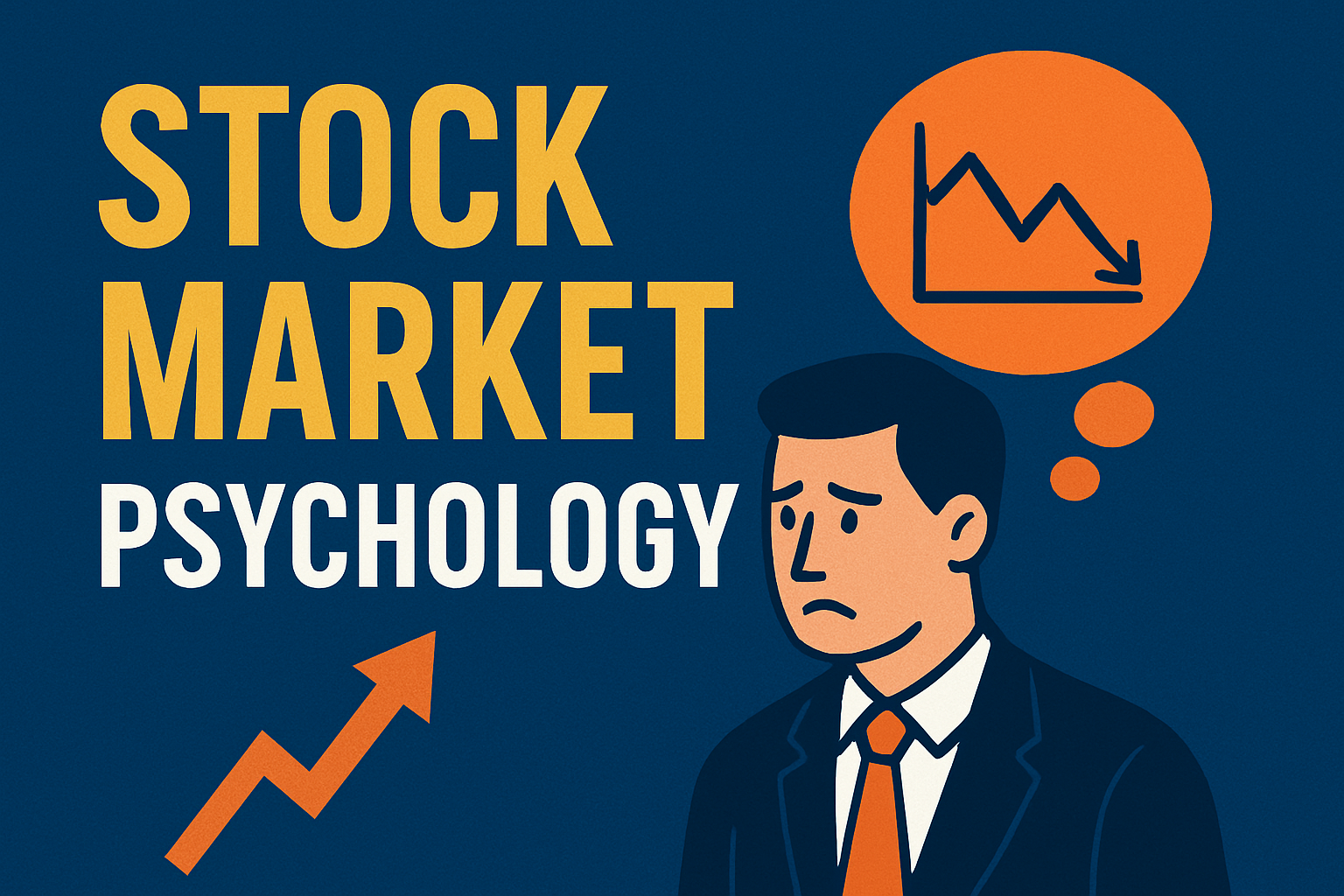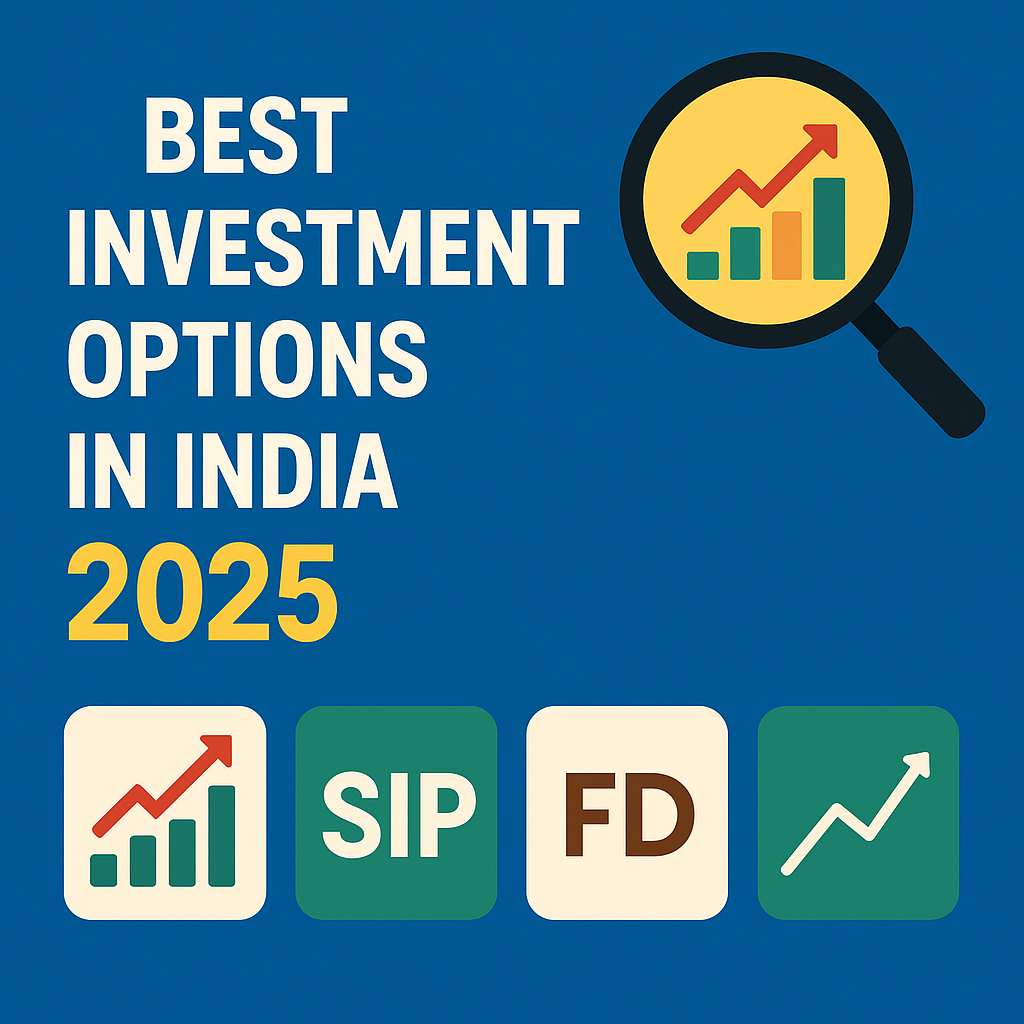Election years often bring heightened market volatility as investors react to potential changes in government policies. The sensitivity of markets to global political outcomes can significantly influence stock prices. It’s crucial for investors to understand these dynamics.
Historically, elections that led to significant structural reforms, changes in fiscal or monetary policies, or shifts in international relations had a profound impact on a country’s economy and financial markets. As we approach election seasons globally, it’s essential to analyze past trends to predict future market movements.

For instance, examining the Sensex volatility during US elections can provide valuable insights. Watch this YouTube short on the historical trends of Sensex during US elections. Additionally, understanding how other significant events, like budget announcements, affect the Indian market can be beneficial. Read more about it in our related blog: How Budget Announcements Affect the Indian Market.
Key Takeaways
- Election years can lead to increased market volatility due to potential policy changes.
- Global political outcomes significantly influence stock market trends.
- Historical data shows that elections resulting in major policy reforms impact economies and financial markets.
- Analyzing past election trends can help predict future market movements.
- Understanding the relationship between elections and market volatility is crucial for investors.
The Pulse of Markets During Election Seasons
Global elections bring more market ups and downs due to political uncertainty. As emerging economies grow, knowing how elections affect markets is key.
Election year volatility means markets swing a lot during elections. This happens because of the unknowns about policy changes and their economic effects.
Defining Election Year Volatility
During election years, markets are more sensitive to political results. Investors tend to wait until the election is over before making moves. This cautious approach leads to market swings as investors react to election news.
Key factors influencing election year volatility include:
- Uncertainty around policy changes
- Potential shifts in economic priorities
- Investor sentiment and risk appetite
The Global Political-Economic Connection
The world’s politics and economy are closely tied. Elections in big countries can affect not just their markets but also global trade and investment.
Emerging economies, set to grow most of the world’s GDP in the next five years, are very sensitive to big country politics. This shows why understanding the link between politics and economy is so important.
| Election Impact | Market Reaction | Economic Implication |
|---|---|---|
| Policy uncertainty | Increased volatility | Delayed investment decisions |
| Change in government | Market adjustment to new policies | Potential for economic reform |
| Election outcome clarity | Stabilization of markets | Boost in investor confidence |
In conclusion, markets are very sensitive to election results. It’s crucial for investors to grasp election year volatility and the global political-economic link to navigate these complex times.
Impact of Global Elections on Stock Market Volatility During Elections
Elections worldwide deeply affect stock markets, causing more ups and downs as investors worry about new policies.
The link between global elections and stock market performance is intricate. Past data shows election years often see more market swings. This happens because people are unsure about who will win and what new rules might come.

Historical Volatility Patterns
Looking at past election seasons helps us understand market reactions to political uncertainty. For example, the S&P 500 usually sees a 3.6% price gain from election to year-end, unless it’s in a bear market. This shows how crucial it is to know the market’s state during elections.
In India, global elections have a big impact on local markets. This is due to global economic ties and how foreign investors react to big election wins.
Measuring Election-Driven Market Fluctuations
To track election-driven market swings, we look at various indicators and indices. The volatility index (VIX) is a key tool to measure market mood during elections. A high VIX means more uncertainty and worry among investors.
When big global elections happen, India’s market reacts in different ways. For instance, during U.S. presidential elections, India’s market sometimes mirrors U.S. market swings, but with different levels and directions. Knowing these patterns helps investors plan for election-related market ups and downs.
By studying past trends and tracking market movements, investors can get ready for election effects on stock market volatility. This helps them make smarter choices and find ways to reduce risks linked to election-driven market shifts.
The Psychology Behind Market Reactions to Political Events
Investor behavior during elections is complex. It involves fear, seeing chances, and guessing market moves. As elections near, the uncertainty about who will win can really sway how investors feel. This often causes the market to swing wildly.
Fear vs. Opportunity: Investor Sentiment
Investors face a big choice: fear or see it as a chance. Some worry about what might happen to their money if a certain candidate wins. Others think they can make a lot by playing the market’s ups and downs.
What guides these views? It’s the stability of the candidates, their economic plans, and the political mood. Investors must carefully weigh these to make smart choices.
Herd Behavior During Political Uncertainty
Herd behavior is key during elections. When things are unclear, many investors follow the crowd. They make choices based on what others do, not their own thoughts. This can cause big swings in the market, as many react the same way to news.
Knowing about herd behavior helps investors. It lets them spot trends or avoid dangers. By seeing when others are following the crowd, they can make wiser moves.
In summary, how markets react to politics is complex. It’s a mix of fear, seeing chances, and following the crowd. Investors who get this can handle the ups and downs of global markets better during elections.
U.S. Presidential Elections: The Global Market Mover
The U.S. presidential election has a big impact on markets worldwide. Its outcome can cause big changes in stock markets, not just in the U.S. but also in places like India.

Historical S&P500 Performance During Election Cycles
The S&P500 has shown different results during U.S. elections. Analyzing past trends helps guess how the market might act in future elections. For example, U.S. stocks lost over $4 trillion after the Trump administration talked about recession due to tariffs.
“The stock market is filled with individuals who know the price of everything, but the value of nothing.” This quote shows how hard it is to guess market moves just from politics.
NASDAQ Trends Before and After U.S. Elections
The NASDAQ, with its focus on tech stocks, shows how people feel about new ideas and growth. Pre-election trends are often a mix of caution and hope, based on who seems more business-friendly.
- Pre-election cautious optimism
- Post-election market adjustments based on policy announcements
Impact on Sensex and Nifty During U.S. Election Years
The Indian stock market, shown by the Sensex and Nifty, also feels the effects of U.S. elections. Historical data shows short-term ups and downs, but the lasting effects depend on the new administration’s economic plans.
| Year | Sensex Change | Nifty Change |
|---|---|---|
| 2016 | 1.23% | 1.45% |
| 2012 | -1.05% | -0.89% |
In conclusion, knowing how U.S. elections affect global markets helps investors make better choices. By looking at how the S&P500, NASDAQ, Sensex, and Nifty do during elections, investors can handle the market’s challenges.
European Political Landscapes and Market Consequences
European elections are set to shake the global economy. The UK is gearing up for a general election, and the EU parliament elections are coming. Investors are watching closely for any signs of market swings.
The UK’s politics are changing, with a possible centrist government on the horizon. This could greatly affect the FTSE index. It might change how investors feel and what they do in the market.
UK General Elections and FTSE Reactions
The FTSE 100 index usually holds up during UK elections. But, the results can still shake things up. A government with a clear majority might bring stability. But, a hung parliament could cause some short-term ups and downs.
Investor sentiment is very connected to the election’s outcome. A centrist government might make investors more confident in the UK’s economy.
EU Parliament Elections and Eurozone Market Movements
The EU parliament elections might give more power to populist nationalists. This could change the Eurozone’s policies. It might affect the euro’s value and how markets move in Europe.
Market watchers are keeping a close eye on how these elections will change Eurozone policies. They’re especially interested in trade and economic reforms.
How Indian Indices Respond to European Political Shifts
Indian markets, like the Sensex, are very sensitive to global politics. European elections can sway investor feelings, which can affect money flowing into India.
A stable European political scene can attract more foreign institutional investment in India. This can help the market do well. But, if Europe is uncertain, it could make Indian markets more volatile.
As global politics keeps changing, it’s key for investors to understand how European elections affect Indian markets. This knowledge is vital for navigating these complex times.
Asian Elections and Their Regional Market Impact
Elections in Asia are key in shaping market trends. They affect economic policies, trade, and market stability. Investors watch these closely.
Japanese Elections and Nikkei Performance
Japanese elections greatly impact the Nikkei index. The Nikkei shows Japan’s economic health. It reacts to political changes.
For example, the 2021 Japanese general election saw Nikkei 225 changes. Investors were watching the new economic policies.
Key factors influencing Nikkei during Japanese elections include:
- Economic policies proposed by the winning party
- Potential changes in trade agreements
- Investor sentiment regarding the stability of the government

Chinese Political Transitions and Market Effects
China’s political changes, like the Communist Party Congress, deeply affect markets. These decisions guide China’s economic policies. They impact trade, investment, and currency.
The impact on markets can be seen in several areas:
- Changes in trade policies, affecting export-oriented economies
- Shifts in investment flows, as policies favor certain sectors
- Currency fluctuations, as China’s economic policies influence the yuan
Cross-Border Influences on Indian Markets
Elections in Japan and China affect Indian markets. India’s growing ties with these countries mean political changes there impact trade and investment. This also influences market sentiment.
| Country | Potential Impact on Indian Markets |
|---|---|
| Japan | Increased investment in infrastructure, potential boost to trade |
| China | Trade policy changes, potential impact on Indian exports |
Indian investors need to understand these cross-border influences. Keeping up with political news in neighboring countries helps make better investment decisions.
Policy Uncertainty: The Primary Market Disruptor
Policy uncertainty is a big problem in global markets. It affects how investors make decisions and keeps the market unstable. Election years make this problem worse because of the chance of new government policies.
When new policies are expected, markets can swing back and forth. Investors often wait to see what happens before they invest. They want to know the outcome of elections and what policies will be next.
Trade Policy Changes and Market Reactions
Trade policies are key to a country’s economy9nd stock prices. But, good trade agreements can make markets feel better by opening up new markets and cutting down trade barriers.
Taxation Reforms and Equity Performance
Tax changes are also important for markets. Changes in corporate tax rates can straight affect company profits. A reduction in corporate tax rates can make companies more profitable, which can make their stock prices go up.
But, if capital gains tax goes up, it might scare off investors. This could make the market less active. The thought of these tax changes during elections can make the market shake as investors adjust their plans.
Interest Rate Decisions Following Political Shifts
Interest rates are a tool for central banks to control the economy. Political changes after elections can affect these decisions. New governments might have different economic goals or change how central banks work.
Changes in interest rates can change how attractive different investments are. For instance, higher interest rates might make bonds more appealing than stocks. This could lead to a shift in where investors put their money.
The Critical Timeline: Pre-Election, Exit Polls, and Results Day
The timeline of elections is key to understanding market trends. Elections can greatly affect the stock market. Knowing the electoral process helps investors manage market risks.
Market Behavior in the Campaign Phase
During the campaign, markets are cautious. Investors watch candidates’ promises closely. Uncertainty is high, causing market fluctuations.
Investors often wait to make big decisions until the election is over.
The campaign phase is marked by:
- Increased market volatility due to uncertainty
- Investors being cautious and adopting a wait-and-see approach
- Close monitoring of candidates’ policies and election promises
The Exit Poll Effect on Short-Term Trading
Exit polls can greatly affect short-term trading. Markets react quickly to these polls. Stock prices change based on who is seen as the winner.

- Immediate market reactions based on the perceived winner
- Short-term trading opportunities arising from market volatility
- Potential for market corrections if exit polls are later contradicted by actual results
Post-Result Market Adjustments
After the election results, markets adjust. Investor sentiment changes quickly. If the result matches expectations, markets may stabilize. Otherwise, volatility can increase.
Post-result adjustments include:
- Markets incorporating the implications of the election result
- Investor sentiment shifting based on the outcome
- Potential for market stability if the outcome is as expected
Foreign Institutional Investors in India During Global Elections
India is becoming more important in the global economy. This makes it a great place for foreign investors, especially during global elections. India’s stability and neutrality are key reasons for its growing appeal.
FII Behavior During Global Election Cycles
Foreign institutional investors (FIIs) greatly influence India’s stock market. Their actions during global elections show their trust in India’s economy. This is especially true when the world is uncertain.
FIIs are careful when global politics are unstable. But India’s strong economy and stability make it a top choice for foreign investors.
Capital Flow Patterns Between India and Developed Markets
Capital flows between India and developed markets change with global elections. When developed markets show stability or positive policies, FII attitudes can shift.
This shift can bring more or less money into Indian markets. Knowing these patterns helps investors make better choices.
| Year | FII Investment in India (USD Billion) | Global Election Impact |
|---|---|---|
| 2019 | 7.4 | Indian General Elections |
| 2020 | 12.8 | US Presidential Elections |
Indian Market Dependency on FII Sentiment
The Indian market’s performance depends a lot on FII sentiment. During global elections, FII feelings set the market’s direction.
A positive FII mood can make the market go up. But a negative mood can cause market ups and downs. So, it’s key to understand FII actions during global elections.
Currency Markets: The USD-INR Relationship During Political Transitions
When big political changes happen, the USD-INR relationship gets shaky. This affects Indian businesses a lot. The ups and downs in the USD-INR rate can really hurt India’s economy, especially for companies that trade internationally.
Historical Currency Movements During Major Elections
Big global elections often make the USD-INR rate more unpredictable. For example, in 2016, the INR saw big swings against the USD. This was because people were unsure about the election’s effect on trade policies.
The table below shows how the USD-INR rate changed during big elections over the last ten years:
| Election Year | USD-INR Average Rate | Pre-Election Rate | Post-Election Rate |
|---|---|---|---|
| 2016 | 67.09 | 66.56 | 67.83 |
| 2019 (Indian General Elections) | 69.45 | 68.93 | 70.12 |
| 2020 (U.S. Presidential Elections) | 74.83 | 73.92 | 75.63 |
Impact on Import-Export Oriented Indian Businesses
The ups and downs in the USD-INR rate can really hit Indian businesses, especially those that import and export. A stronger USD can make Indian exports cheaper, but it also makes imports more expensive. This can hurt profit margins.
For instance, in 2020, the INR falling against the USD made imports more costly for businesses. But, it made Indian exports cheaper, helping them in the global market.

Currency Hedging Strategies for Election Periods
To deal with currency risks during elections, Indian businesses can use different hedging strategies. These include:
- Forward Contracts: Locking in exchange rates for future deals to avoid losses from currency changes.
- Options Contracts: Giving the right, but not the duty, to exchange currency at a set rate.
- Currency Swaps: Swapping cash flows based on different interest rates or currencies to manage risks.
By using these strategies, businesses can handle the uncertainty of currency markets better. This helps them keep their finances stable during political changes.
Sector-Specific Impacts on Indian Markets
The stock market reacts differently to global elections. Each sector in the Indian market has its own way of responding. This is due to policy changes, regulatory reforms, and economic stability.
IT and Technology Sector Responses
The IT and technology sector is known for its resilience and growth during elections. Historically, this sector has shown stability thanks to its focus on exports and global demand. Yet, changes in data localization and taxation policies can affect it.
“The IT sector’s ability to adapt to changing regulatory landscapes will be crucial during election cycles,” says a leading industry analyst.
Pharmaceutical Industry Dynamics
The pharmaceutical industry is also impacted by election outcomes. Changes in healthcare policies and drug pricing can affect it. Companies with a strong portfolio of generic drugs may benefit from favorable policies. On the other hand, those focused on patented drugs may face challenges.
Energy Sector Volatility
The energy sector, including traditional and renewable sources, sees volatility during elections. Investors closely watch election manifestos to understand future energy policies. This affects energy stocks.
Banking and Financial Services Reactions
The banking and financial services sector is sensitive to election results. Changes in monetary policies, banking regulations, and fiscal policies can impact it. Reforms aimed at improving financial inclusion and banking stability can be positive. But changes in interest rates can affect profitability.
As
“The outcome of elections can significantly influence the financial sector’s growth trajectory, making it essential for investors to stay informed about policy changes.”
Understanding these impacts can help investors make better decisions during elections. By analyzing the effects of election outcomes on different sectors, investors can navigate the market complexities.
Risk Mitigation Strategies for Indian Investors
Indian investors face big challenges during election times. The stock market can be very unpredictable. But, with the right strategies, they can lessen losses and find new opportunities.
Portfolio Diversification Techniques
Diversifying a portfolio is a key strategy. By investing in different types like stocks, bonds, and real estate, investors can avoid big losses. Asset allocation is important; it means spreading investments to balance risk and reward.
For Indian investors, spreading across sectors is also smart. Mixing defensive sectors like consumer goods and healthcare with cyclical sectors like finance and industrials can help. This way, they can handle market ups and downs better.

The SIP Advantage During Political Uncertainty
Systematic Investment Plans (SIPs) are a smart way to invest. They let investors put in a set amount regularly, no matter the market. This dollar-cost averaging helps smooth out market ups and downs.
SIPs are great during elections because they help investors stay steady. By keeping up with SIPs, investors can grow their money over time.
Defensive Stock Selection Criteria
During elections, investors look for defensive stocks that stay stable. These are companies with steady earnings and dividends. They should have a strong financial base, low debt, and a history of success.
Indian investors should focus on companies that do well in tough times. Sectors like consumer staples, healthcare, and utilities have stable stocks. These can keep portfolios steady during election periods.
Hedging Tools and Techniques
Hedging is about using financial tools to protect investments. Tools like options contracts and futures help investors shield their portfolios from market drops.
For Indian investors, knowing how to hedge is key during elections. Hedging can limit losses while still allowing for gains in the market.
Technical Analysis Tools for Election Period Trading
Election periods can be uncertain for the stock market. Technical analysis is key for investors. It helps gauge market sentiment and predict movements.
India VIX as an Election Barometer
The India VIX measures market volatility. It’s a key indicator during elections. A high India VIX means more volatility, while a low value suggests stability.
Understanding India VIX: It’s based on NIFTY Index Options prices. It shows the market’s expected volatility for the next 30 days. Investors use it to adjust their strategies based on risk.

Chart Patterns That Emerge During Political Events
Chart patterns are vital in technical analysis. During elections, certain patterns offer insights into market trends. Some common ones include:
- Head and Shoulders: Shows a potential trend reversal.
- Double Top/Double Bottom: Indicates a big change in sentiment.
- Triangles: Signals a consolidation before a breakout.
Using Technical Indicators to Navigate Election Volatility
Technical indicators are crucial for election volatility. Some important ones are:
| Indicator | Description | Usage |
|---|---|---|
| Moving Averages | Identifies trends and support/resistance levels. | Determines market direction. |
| Relative Strength Index (RSI) | Measures recent price changes. | Finds overbought/oversold conditions. |
| Bollinger Bands | Plots two standard deviations around a moving average. | Understands volatility and breakouts. |
By using these tools, investors can create a solid strategy for election periods. These tools help manage risks and find opportunities in market volatility.
The Global Election Calendar 2024-2025: Preparing for Market Impact
In 2024-2025, the global election calendar will play a big role in stock markets around the world. Countries like India are key to the global economy. It’s important for investors to know about the election calendar.

Major Upcoming Elections Worldwide
Many big elections are coming up globally in 2024-2025. These include:
- The U.S. Presidential Election in November 2024, which will greatly affect global markets.
- The Indian General Elections, important for understanding the world’s largest democracy.
- European Parliament Elections, which could change the European Union’s future and policies.
According to
“The Economist”
These elections will shape the political future of their countries. They will also affect global trade and economic policies.
Potential Market Hotspots for Indian Investors
Indian investors should watch for market hotspots from these elections. The U.S. Presidential Election could change global trade policies. This will impact IT and technology sectors.
The European Parliament Elections might change EU rules. This could affect industries like pharmaceuticals and energy.
Creating a Political-Economic Calendar
To deal with these complex events, investors can make a political-economic calendar. It helps track election dates and policy changes. It also guides investment strategies.
By staying informed, Indian investors can reduce risks. They can also find opportunities from the global election calendar.
Conclusion: Navigating the Political-Market Nexus as an Indian Investor
It’s key for Indian investors to grasp how politics and markets interact. This knowledge helps in making smart choices. With global elections affecting stock markets, staying updated is crucial.
Understanding election-driven market changes is vital. This knowledge helps investors prepare for election seasons. By recognizing patterns and trends, they can face challenges and seize opportunities.
This article aims to guide Indian investors through the complex politics and markets link. By staying informed and adapting, investors can make better decisions. This helps them reach their financial goals.
FAQ
How do global elections impact stock market volatility?
Global elections can greatly affect stock market volatility. This is because they introduce uncertainty. Markets then react to possible policy changes and political outcomes, causing stock prices to fluctuate.
What is election year volatility, and how does it affect the market?
Election year volatility refers to the increased market ups and downs seen during elections. This happens because of the uncertainty about election results and potential policy changes. It affects how investors feel and how the market performs.
How do U.S. presidential elections influence the Indian stock market?
U.S. presidential elections can impact the Indian stock market in several ways. This includes trade policies, global economic conditions, and how investors feel. The effects are often seen in how well Indian indices like the Sensex and Nifty do.
What role do foreign institutional investors (FIIs) play in the Indian stock market during global elections?
FIIs have a big role in the Indian stock market during global elections. Their investment choices are influenced by global economic conditions, political stability, and how attractive the market is. This affects capital flows and how the market feels.
How can Indian investors mitigate risks during global election periods?
Indian investors can reduce risks during global election periods by spreading out their investments. They can also use systematic investment plans (SIPs), pick defensive stocks, and use hedging tools. This helps manage potential losses.
What is the significance of the USD-INR relationship during political transitions?
The USD-INR relationship is very important during political transitions. It affects the profits of import-export businesses in India. Currency movements can be influenced by political outcomes and policy changes. So, it’s important to have effective currency hedging strategies.
How do sector-specific impacts vary during global elections?
Sector-specific impacts during global elections vary based on the policies announced or expected. For example, the IT and technology sector may be affected by trade policy changes. On the other hand, the energy sector may react to changes in energy policies.
What technical analysis tools can be used during election periods?
Technical analysis tools like the India VIX, specific chart patterns, and technical indicators can help during election periods. These tools help investors make informed decisions based on market trends and sentiment.
Why is it important to create a political-economic calendar for investment decisions?
Creating a political-economic calendar is key for anticipating major elections and their market impact. It helps investors prepare for possible market hotspots. This way, they can make informed decisions based on expected political events.
Should I invest during an election year globally?
Investing during an election year globally needs careful thought about the risks and opportunities. It’s important to stay updated on global election outcomes and their market impact. Adopting strategies that reduce risk is crucial.
What are the historical stock market patterns during global elections?
Historical stock market patterns during global elections show markets tend to be more volatile. This is due to the uncertainty about election outcomes. However, the long-term impact often depends on the policies implemented after the election.










